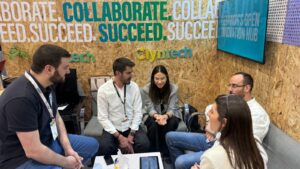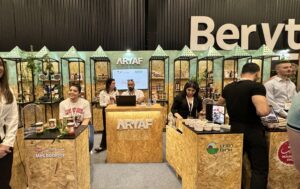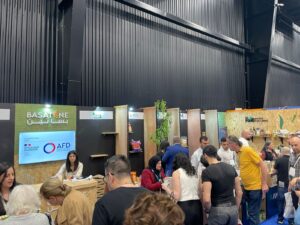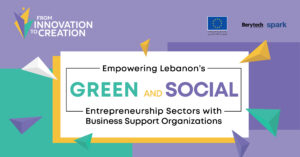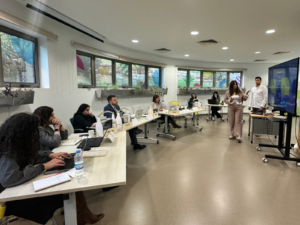
Technical Assistance Report
Berytech, through THE NEXT SOCIETY Advocacy Panel, has been leading on setting a national innovation strategy for Lebanon since 2017, as part of THE NEXT SOCIETY action plan initiated by ANIMA Investment Network and implemented in Algeria, Egypt, Jordan, Lebanon, Morocco, Palestine and Tunisia with the financial support of the European Union.
Experts hired by Berytech have written a report which proposes a roadmap of 29 actionable recommendations for universities and other key ecosystem players to boost the technology transfer dynamics in Lebanon. It defines a financing mechanism and a reward system to incentivize researchers in Lebanon to develop projects with a commercialization potential.
Acting as a Task Force at the national level, the objective of THE NEXT SOCIETY Advocacy Panel is to oversee the formulation of the innovation roadmap, its implementation, evaluation and update, with the objective of strengthening the national innovation system, fostering coordination among actors involved and improving concrete instruments of the innovation policy.
The panel is composed of Lebanese private sector representatives and investors, innovation stakeholders, relevant Ministries and their agencies, the European Union Delegation to Lebanon as well as academic experts.
The report presented has been commissioned by this panel. Findings have highlighted that, while Lebanese researchers may be good publishers, there is a need to incentivize them and create reward systems to push them to develop projects with commercialization potential. The Lebanese ecosystem is challenged by the lack of funding for applied research, lack of Intellectual Property (IP) policies and support as well as weak links between academic research and industrial needs.
“There is a need to plant the innovation seed in academia,” comments Krystel Khalil – Programs Director at Berytech and lead on the Advocacy Panels. “Most industries claim to be innovative, but they don’t even have an R&D department, which is crucial for innovation.”
Therefore, there is a need to develop the technology transfer landscape and encourage the development of researches that address market needs turning them into commercial startups, or better, connecting them with industrialists.
“Connecting local research and industry, in other words technology transfer, is a major driver of value creation and innovation for MENA countries,” confirms Mathias Fillon, THE NEXT SOCIETY coordinator at ANIMA Investment Network. “We address it both at the micro level, through the Tech Booster acceleration programme supporting success stories of research-based start-ups, and at the policy level through the Advocacy Panel and technical assistance activities”.
Prioritizing Technology Transfer
The process of transforming innovations and technological findings emerging from universities into market-ready products is essential to driving economies forward. Researchers can typically find the answers to various technical challenges, given that they are rightfully connected to their target industry. When and if they are, they would subsequently be prepared to develop innovations that can transform the market and majorly contribute to job creation.
Therefore, technology transfer and commercialization are some of the tools that developing countries need to prioritize. According to the World Intellectual Property Organization – WIPO, Lebanon is currently performing below expectations given its level of development. However, recently, the lights have been shed on the potential of researchers to drive economic prosperity and solve current challenges. Thus, the country is moving towards an economy that is driven by production, led by local Lebanese researchers.
Advocacy Panels
The main objective of the first advocacy panel, held in November 2017, was to benchmark innovation in Lebanon with other Mediterranean countries. Technology transfer was identified as one of the main issues to be tackled to reinforce the Lebanese innovation ecosystem. The second advocacy panel was held in September 2018 to discuss the progress that had been achieved by Lebanon, and to identify the most promising sectors when it comes to innovation and competitiveness that should be addressed first by THE NEXT SOCIETY action plan. The panel participants decided to address the need for enhanced technology transfer support mechanisms through a technical assistance mission.
Technical Assistance Mission
Championed by Berytech, the Technical Assistance Mission was then conducted in 2019 as a follow-up to the public-private dialogue initiated during the two previous advocacy panel meetings.
The objective was improving the process of the technology transfer landscape in Lebanon by proposing a methodology that is able to empower researchers and students in the process of turning their end of year research projects into viable businesses.
The experts hired by Berytech defined a financing mechanism and a reward system for applied research adapted to the Lebanese academic context in order to incentivize researchers to develop projects with a commercialization potential, tailored to the needs of at least 5 universities in Lebanon.
Report Executive Summary
The Technical Assistance Report provides an analysis of the Lebanese technology transfer ecosystem, identifies its gaps, and proposes actionable recommendations to be implemented by the different ecosystem stakeholders of technology creation and valorization.
The three pillars that make up the framework of this report and for which recommendations are made are:
- Research Management, which is the process of turning research into market-ready creations, which includes the types of existing and needed collaborations between the different stakeholders, technical and financial support, and infrastructure.
- Innovation Toolboxes, which encompasses the tools and knowledge needed to valorize new technologies.
- Innovation Commercialization, which comprises three main tracks: (1) commercializing technologies via licensing, (2) selling and (3) spinning-off into ventures.
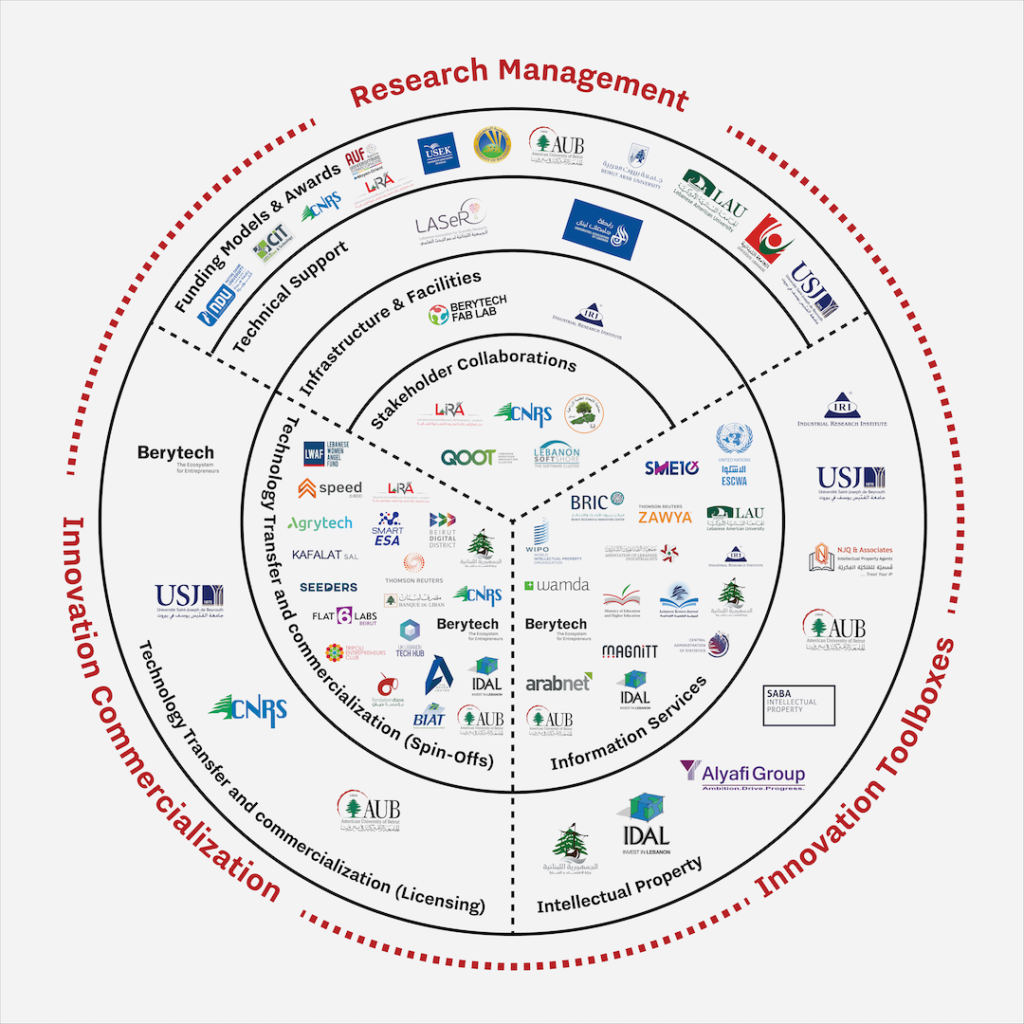
Findings
Dr. Mohab Anis – CEO of INNOVETY, a leading innovation management consulting firm and the expert hired to conduct the Technical Assistance Mission, explains, “As we began to analyze the current situation against the above mentioned three pillars, gaps and areas of opportunity started to appear. These elements were refined through the inputs of several specialists, coming from different backgrounds including universities, governmental institutions and the private sector.” This combination of multiple approaches, primary and secondary research as well as the consultant’s input, resulted in a well-rounded picture of the current Lebanese status, and a promising outlook on its future positioning in technology transfer and commercialization.
Out of more than thirty gaps identified in the report, affecting factors revolve around the following issues: Lebanon’s weak collaborative culture, the so called ‘valley of death’ syndrome caused by the lack of activities and funding available for researchers in the prototyping stage, lack of incentives and reward mechanisms, lack of awareness and knowledge of commercialization-related topics, weak IP protection on the national level, lack of players involved in managing intellectual property and licensing, poor and disconnected information services, and limited activities focusing on technology transfer. In a nutshell, a general lack of support in the ‘go to market’ process for researchers, as well as weak intellectual property knowledge and transfer.
Recommendations
29 recommendations are proposed in the report to address the identified gaps, areas of opportunity and growth. The best practices carried out in various countries such as the United States, Canada, Germany, Portugal and Egypt acted as a guideline for the recommendations, as well as validation of their feasibility. Part of those recommendations are reward mechanisms, monetary and non-monetary, that act as incentives for researchers and entrepreneurs to commercialize technologies.
Given that universities are key stakeholders in the technology transfer and commercialization ecosystem, the responsibility of revolutionizing this process in Lebanon, falls largely on their shoulders. The roadmap, as a concluding directory of the recommendations developed, is mainly focused on five universities: Lebanese American University, Saint Joseph University, American University of Beirut, Holy Spirit University of Kaslik, and the University of Balamand.
The report concludes by categorizing the recommendations into three main sections: top-down actions, bottom-up actions, and support mechanisms. The roadmap follows a chronological order that each university is recommended to follow depending on the level of maturity and available resources.
The main goal is to transfer research into marketable products, whereby they can either be sold/licensed, or spun-off into a venture, which mainly requires top down actions. In the selling/licensing track, the roadmap unveils the steps needed to be taken, from the mapping of opportunities between university research and the different applications in various value chains, to matchmaking with the industry and the promotion of success stories. In the spin-off track, universities must ensure that they are providing their staff and students with the correct resources to support them in starting their venture.
All of this is likely to happen while the internal intellectual property policy is being developed, updated, and disseminated to students and faculty. In addition, several bottom-up activities should take place to strengthen and nurture the culture of innovation within universities, such as the changing of curricula, and the introduction of entrepreneurial extracurricular activities.
Finally, and in parallel, government and intermediaries play a crucial role as support mechanisms that encourage, directly and indirectly, the strengthening and efficiency of this process through policies, matchmaking, fund provision and facilitations, and more.
Request Report
If you are an active player in technology transfer and would like to implement the best practices and framework to grow the ecosystem in Lebanon, please fill in this form to receive the full report.
THE NEXT SOCIETY is an open community of changemakers, entrepreneurs, investors, corporates, NGOs, public and private innovation, research and economic development hubs from Europe and 7 Mediterranean countries: Algeria, Egypt, Jordan, Lebanon, Morocco, Palestine and Tunisia.
It aims at mobilizing, promoting and reinforcing innovation ecosystems and economic development in the MENA region. To reach these goals, THE NEXT SOCIETY launched a four-year action plan (2017-2020), co-funded by the EU up to 90% for a global amount of EUR 7.8 million budget. It supports the emergence of talents and innovative leaders who will drive the next trends and usages by targeting startups, clusters and technology transfer offices to accompany their development. www.thenextsociety.co
ANIMA Investment Network is an international economic development network that aims to work to the promotion and development of the Mediterranean. The ANIMA network brings together 80 members from 18 countries of the Euro-Mediterranean area, including national and regional investment promotion and economic development agencies, business federations, innovation centres, international investors and research institutes. ANIMA’s objective is to contribute to the continued improvement of the business and investment climate, as well as encourage shared and sustainable economic development in the Mediterranean. To know more about ANIMA Investment Network, please visit www.anima.coop.



